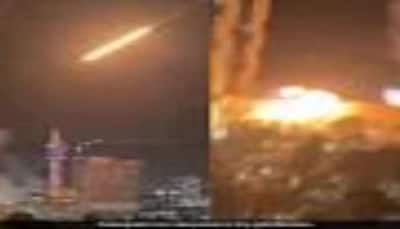New Delhi: A few airstrikes have the power to shake borders. But a nuclear strike? That could rattle the whole planet. As tensions between Israel and Iran spiral dangerously out of control, experts are sounding the alarm – if this turns into a nuclear war, the fallout will not stop at Tehran or Tel Aviv. It might not even stop at the Middle East.
Israel has launched a devastating assault on Iran’s nuclear and military infrastructures. Dubbed Operation Rising Lion, the mission saw over 200 Israeli fighter jets bomb over 100 Iranian targets, including Natanz – the centre of Iran’s uranium enrichment programme. The message was loud. Iran’s response? Even louder – revenge is coming.
Iran admitted its Natanz facility took a hit but denied any radioactive leaks. Still, the International Atomic Energy Agency (IAEA) is not taking chances. It is urging both sides to dial down the heat. But the bigger question now echoes far beyond the region. If nukes are deployed, is India safe?
Will India Be Hit by Radiation?
Experts say the immediate risk of nuclear radiation reaching India is extremely low, unless an unprecedented chain of atmospheric shifts occurs. But that is just one piece of the puzzle. A nuclear war in West Asia could unleash a chain reaction of oil price spikes, halted trade and major risks for over eight million Indian workers living in the Gulf.
India imports the majority of its oil from the Gulf. Even a few days of instability can push prices through the roof, choke supply lines and drive inflation. The stock market will not be immune either. With every explosion in West Asia, there is a shockwave in Mumbai’s Dalal Street.
Memories of Chernobyl Still Haunt
This is not fear-mongering, it is history. When the Chernobyl disaster struck Ukraine in 1986, radiation clouds reached as far as Sweden – over 1,000 km away. And that was not even a nuclear bomb. If a high-yield warhead explodes in the Middle East and if winds shift eastward, scientists say there is a tiny but real possibility of trace contamination reaching South Asia.
For those who believe nuclear damage is localised, remember Hiroshima and Nagasaki. Cities wiped off the map. Children born years later suffered deformities. Cancer, trauma and grief lingered for decades. That kind of horror is not confined by borders.
India and Pakistan have stood at the edge before. Just weeks ago, after a terrorist attack in Jammu Kashmir’s Pahalgam, New Delhi launched Operation Sindoor and hit terror launch pads and airbases deep inside Pakistan. That sparked fears of a nuclear flare-up too.
Fortunately, it did not escalate, but the memory is still fresh.
IAEA’s Director General Rafael Grossi is seeking to visit Iran, hoping to calm the storm. But every hour brings the world closer to a moment no one wants. If Israel and Iran cross that final line, the damage could spiral far beyond the Middle East.
India might not be in the blast zone. But in a global nuclear nightmare, distance offers little protection.
Stay informed on all the , real-time updates, and follow all the important headlines in and on Zee News.







